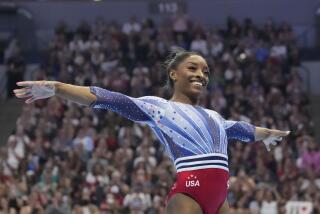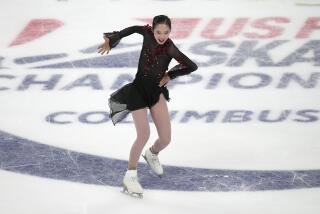U.S. Signals ‘Go’ for Kwan
- Share via
As she walked past a line of TV cameras and clusters of spectators to reach the glass doors at the entrance of the East West Ice Palace on Friday, Michelle Kwan tried to tell herself it was just another day.
She didn’t quite succeed.
“It was intense this morning at the rink,” she said. “This was a situation I’d never been in before. I was thinking, ‘This is a normal practice. You can do it. You’ve done the jumps before.’ ”
But rarely had she done them with so much at stake.
Kwan missed the U.S. figure skating championships and a chance to win a berth on the Turin Olympic team because of a pulled groin muscle, her second major leg injury in two months. In deference to her remarkable career, she was granted a berth on the team conditional upon her ability to prove her fitness.
She presented her case in Artesia on Friday to a five-judge panel selected by U.S. Figure Skating to monitor her progress and evaluate the difficulty of her programs. While the judges watched from the hockey bench area, bundled up against the chill in the empty rink, she delivered performances that were flawed but impressive. The panel took an hour to unanimously affirm her nomination to the Turin team and give her a chance to earn the gold medal that would repair the only hole in her stellar resume.
“It’s truly the opinion of this monitoring team that Michelle could win the Olympics,” said Bob Horen, a panel member and chairman of U.S. Figure Skating’s International Committee.
“She definitely qualified. We really, really believe she’s skating very well.”
Kwan, 25, fell while attempting a double axel in her short program, and she didn’t incorporate a triple loop into either routine. Nor did she show the judges a triple-triple combination jump, a staple in the arsenal of elite skaters and a valuable asset in the sport’s new point-driven scoring system -- a system under which she has competed only once, finishing fourth at last year’s world championships.
Nonetheless, her intricate footwork, steady spirals and the triple-double-double combination jump in her Rachmaninov long program displayed promise of better to come by Feb. 21, when the women’s Olympic competition begins. Horen said he’d rated her spins and spirals at Level 3 or 4, which would earn crucial technical points.
In choosing to perform her long and short programs within a 12-minute span, she demonstrated her stamina and determination had not diminished through a season in which the skating world questioned her physical resources and wondered if she would get an opportunity to complete the set of medals she had begun by winning silver at Nagano in 1998 and bronze at Salt Lake City four years ago.
“I’m thinking gold is good,” a smiling Kwan said at a news conference at a hotel near Los Angeles International Airport.
“I’m staying positive, feeling good, injury-free. Right now, I’m just going for it.”
Kwan’s teammates in Turin will be Sasha Cohen of Corona del Mar and Kimmie Meissner of Bel Air, Md., who finished first and second, respectively, at the U.S. championships. Emily Hughes of Great Neck, N.Y., the third-place finisher, remains an alternate in case one of the top three becomes ill or injured before the women’s event begins at Turin. Hughes, the younger sister of 2002 Olympic champion Sarah Hughes, will also compete in the World Championships at Calgary, Canada, in March.
Kwan said she hadn’t spoken to Hughes, but Kwan knew how the teenager must have felt.
Kwan was in a similar position in 1994, when Nancy Kerrigan petitioned for a place on the U.S. team for the Lillehammer Games after she’d been clubbed on the knee and rendered unable to compete at the national championships. Kerrigan’s success meant that Kwan, then 13, did not compete at the 1994 Olympics.
Kwan said Kerrigan had called her early Friday morning to wish her luck. “I felt today I had a job to do,” Kwan said. “I tried to stay present, within myself.”
Dressed in casual warmup clothes instead of the elaborate costumes she reserves for competitions -- and wearing lighter makeup than she would for an audience -- Kwan performed her long and short programs, in that order. She took to the ice at 11:02 and, after only five minutes’ warmup, began her long program.
Although she usually skates before huge crowds, her audience on Friday was composed of the judges; officials from U.S. Figure Skating and the U.S. Olympic committee; her coach, Rafael Arutunian; her parents; sister; and two pool reporters. Horen and fellow panelist Charles Cyr stood for most of the time Kwan was on the ice, but the other monitors -- former skater Brittney Bottoms, and judges Lorrie Parker and Paula Naughton -- sat. All took notes that they later shared with Kwan.
She ran through her program, omitting a double axel but landing a triple salchow, triple flip and two combination jumps. Her father, Danny, applauded when she landed a triple-double-double, and a rink employee let out a whoop.
She stayed on the ice and about four minutes later began her “Totentanz” short program. She fell on her first jump, a double axel, and her face had an “aw, gee” kind of expression of exasperation. She said she’d resumed doing that jump on Thursday after being told to avoid it and the strain it would cause on her groin muscle, and she decided to include it at the last second.
She regrouped quickly after the fall. “It’s not like, ‘I fell, the world is coming to an end,’ ” she said. “I picked myself up and did a triple lutz-double toe.”
When she finished, the judges conferred and she worked on individual jumps, reeling off two clean double axels. She then went over to where the judges were sitting, letting Cyr do most of the talking. The conversation was cordial, with all involved frequently smiling and laughing as the judges suggested how to alter her body positions and prolong her spirals to score the most possible points.
After a 45-minute break, she returned to the ice for more consultation with the panel. Again, the conversation seemed very cordial among Kwan, Arutunian, Cyr and the other judges.
“I have a lot to work on, a lot of improvement to make,” she said. “I’m going to take advantage of the seconds and the minutes before the Olympics.”
Before leaving the ice for the final time she curtsied to the panel, all of whom she had encountered during her career. And, thanks to them, she will have a chance to extend that career.
“I’ve been in all sorts of situations before, the underdog and then the favorite,” said Kwan, who lost a narrow decision to Tara Lipinski in 1998 and was third to Sarah Hughes and Irina Slutskaya of Russia at Salt Lake City. “After so many years of competing, it’s just going out there and skating the best you can. I just have to get myself ready to the point where I’m not thinking, and I just go for it.
“I’m very, very lucky I’m named to the team. I have a lot to work on and I’ll try my very best to skate from the heart.”
More to Read
Go beyond the scoreboard
Get the latest on L.A.'s teams in the daily Sports Report newsletter.
You may occasionally receive promotional content from the Los Angeles Times.







